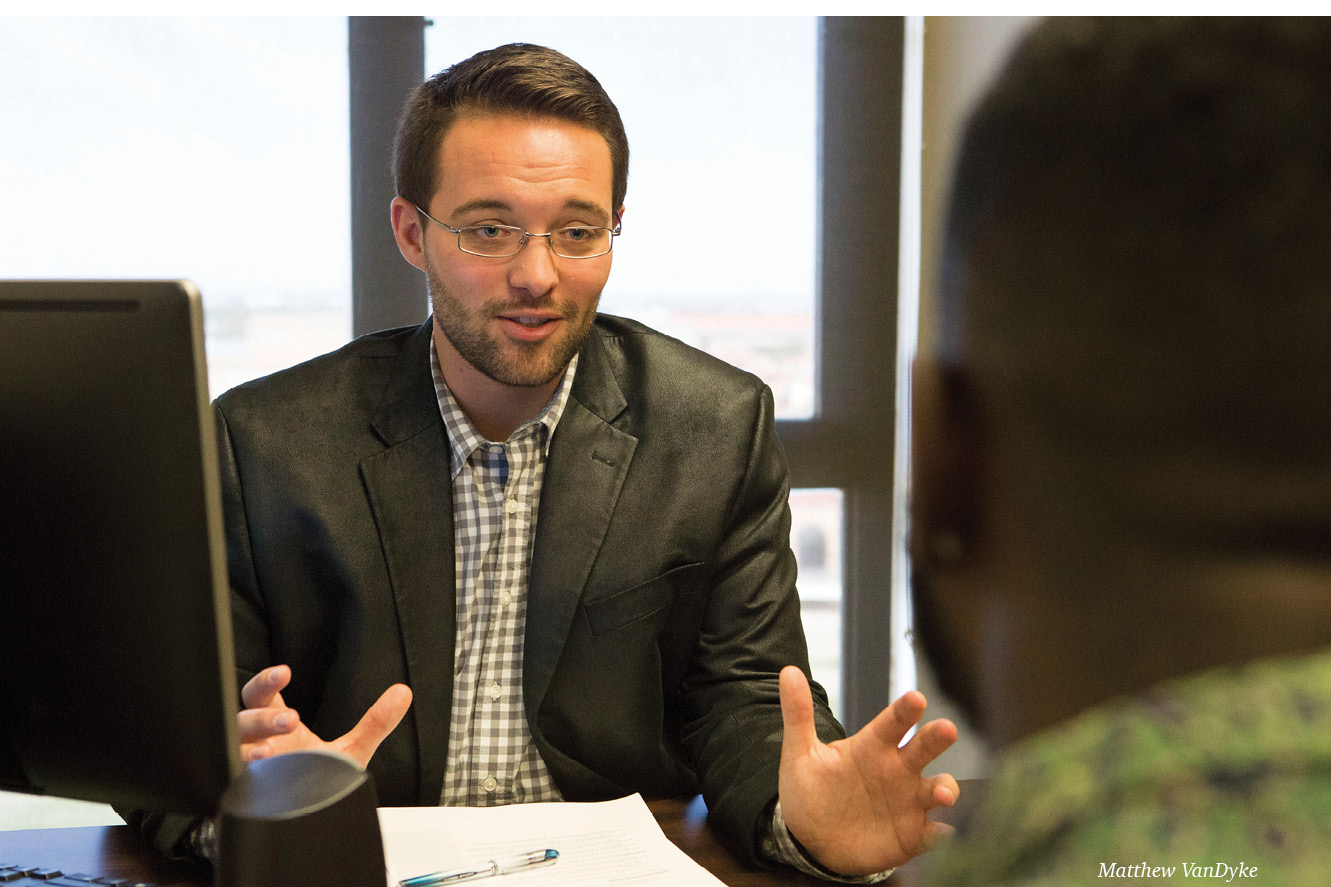Communicating Across Colleges

Expanding all aspects of communication is a major goal of the College of Media & Communication at Texas Tech University. One doctoral student is accomplishing this by conducting research in new areas with new departments on campus.
Matt VanDyke, doctoral student, began working with the water initiative cluster at Texas Tech last fall. VanDyke helps facilitate research initiatives and proposal developments between CoMC and the Water Resources Center on campus. VanDyke said the opportunity to conduct environmental research drew him to the position.
“Environmental communication has been my research interest since my master’s program at Virginia Tech,” VanDyke said. “I have been fascinated with how we communicate about science and the environment.”
Glenn Cummins, associate dean for research, met VanDyke in 2012 when VanDyke was first applying to the doctoral program. Cummins said the faculty was excited that VanDyke chose the college’s doctoral program due to VanDyke’s potential.
“Matt saw an opportunity to be heavily engaged in research and partnering with faculty on research topics,” Cummins said. “That is one thing we really champion. If you come to our Ph.D. program, you get a lot of access to faculty mentors that you may not get at other programs.”
Cummins said the water initiative came out of a request from Texas Tech President Duane Nellis for research projects involving interdisciplinary research clusters. CoMC was involved with an application for a water research cluster, which was selected for funding. The cluster is spearheaded through The Water Resources Center in the Whitacre College of Engineering.
“Water-related issues can mean many things,” Cummins said. “From how drought affects how often people can water their lawns to climate change, there are many issues relevant to this cluster. We laid out a plan of what to do with the funding and one aspect of the funding was going after people to assist with this project.”
Melanie Sarge, Ph.D., assistant professor, has taught VanDyke previously and has worked on research projects with him as well. These projects include research involving the narrative process of environmental issues and the framing of fracking images.
“We have one paper on selective exposure to environmental news articles that has been accepted to a conference,” Sarge said. “We have also been working on a project over cognitive processing of climate change messages. Matt has also coded some of these messages to see what types of messages they are, which helps us put together and design the message that we will be testing.”
VanDyke said he is responsible for bridging different communication and research styles between CoMC and the Whitacre College of Engineering. He said both academic units are able to learn something from each other.
“When talking about complex issues, such as West Texas water issues, you can’t just come at it from a communications perspective,” VanDyke said. “Communication can’t solve everything.”
VanDyke said his main responsibility is starting conversations among departments on campus. He said other colleges on campus might not be aware of projects being conducted in CoMC, and he will try to solve that.
“From a strategic communication perspective, it is very interesting to see how people understand environmental issues,” VanDyke said. “From that, we can see how to communicate and facilitate negotiations involving these issues.”
Sarge said since the research is interdisciplinary in nature, it impacts a wide variety of people. She said all of the work is done for a higher societal good.

“The goal of all of the clusters is to work together on a particular issue,” Sarge said. “Our particular issue is related to new technologies regarding water. The engineering college and the Water Resources Center work on developing new technologies to make cleaner water and improve conservation. Our specific job is to help them communicate what they do and the importance of what they do.”
Sarge said the majority of science-related communication research conducted in CoMC is related to health communication. She said she hopes that the water initiative brings some exposure to the fact that the college is also interested in environmental communication.
“We are at the hub of a lot of innovative technologies being created for energy,” Sarge said. “We are also dealing with water issues that other places in the country are not dealing with. This forces us and our great engineering college to come up with solutions that other people may not be as focused on right now because the problem is not in their backyard.”
Cummins said he has not worked with VanDyke on research often but does appreciate the fact that VanDyke is willing to conduct his own research outside of class requirements.
“I have talked with Matt about research an awful lot,” Cummins said. “He comes in with ideas and designs. He is a very familiar face in the Center for Communication Research because he is an active scholar himself. I have been very pleased with how he has spread his wings in conducting his own research and gathering data outside of class.”
“As we tried to determine who would be an ideal fit for working with us in advancing this cluster, Matt was a strong candidate,” Cummins said. “It just made sense to take advantage of somebody who was already here and already had knowledge of our faculty and facilities.”
VanDyke said that CoMC has realized the importance and benefits of working with other departments on campus. Cummins said the interdisciplinary nature of the clusters is important because it brings new ideas and insights to the table.
“It is interesting when someone from physics communicates with someone from media and communication,” Cummins said. “We share different languages. We share different styles of research. But nonetheless, we can assist each other. We can answer questions that they can’t answer and vice versa.”
VanDyke said, “My role definitely shows our college’s effort to promote more interdisciplinary work. A lot of times people only work with people also in their field. You don’t really get that from our college. People work together in the college and people are increasingly working across academic units as well.”
Sarge said VanDyke’s previous research with CoMC faculty paired with his interest in environmental communication connects well with communicating science topics to the public. She said these two reasons are why VanDyke was chosen to work with the cluster and why she sees VanDyke being successful in the future.
“Matt has been in the program for two years,” Sarge said. “So, he already brings experience to the table in terms of research and the topic itself of translating science and communicating science issues. Also, this is his area of research. This will bring him excellent experience before he enters the job market. He is going to be working on writing grant proposals that are right up the alley of what he studies.”
(Preston Redden graduated in 2015 with a Master of Arts degree in Mass Communications and in 2012 with a Bachelor of Arts degree in Journalism. Jay Crain is a senior electronic media and communications major from De Kalb, Texas.)

